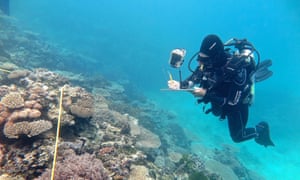Two government reports are expected to project a poor outlook for the reef
The federal government is pushing Unesco’s world heritage committee
to resolve how it will deal with the impact of climate change on world
heritage properties, including the Great Barrier Reef.
It comes ahead of the release of two government reports that are expected to project a poor outlook for the reef, the status of which will be reassessed by Unesco next year after previously avoiding an in danger listing.
The world heritage committee has been reviewing its climate change policy and how countries should manage the impact of the climate crisis on the world heritage system.
At a meeting of the committee in July, Australian representatives
said climate change should not be used as the basis for an in danger
listing for world heritage properties.It comes ahead of the release of two government reports that are expected to project a poor outlook for the reef, the status of which will be reassessed by Unesco next year after previously avoiding an in danger listing.
The world heritage committee has been reviewing its climate change policy and how countries should manage the impact of the climate crisis on the world heritage system.
“We would not expect to see propositions that climate change threats would form the basis for in danger listing individual properties because this is a global problem not amenable to site-level intervention,” Stephen Oxley, from the environment and energy department, told the committee.
“But we do need to find a way to recognise the reality that whole categories of world heritage properties globally are threatened by climate change – coral reefs, glaciers and mountain forests to name three examples.”
The world heritage committee’s new climate policy, which will replace out-of-date guidelines from 2007, was due to be completed this year after a push from Australia but the document is still in development.
At the July meeting, Oxley said Australia was disappointed by the slow progress and “we need a contemporary, evidence-based policy that sets the foundation for tractable climate action in the world heritage system”.
Climate change has been recognised as an existential threat to many world heritage properties.
A 2017 Unesco report looked at the impact on coral reefs, which are especially vulnerable, and concluded that “drastic reductions” in greenhouse gas emissions were “the only real solution” if coral reefs were to stand a chance of survival.
A spokesperson for the environment and energy department said the timing of Australia’s intervention at the July meeting was not related to the world heritage committee’s assessment of the Great Barrier Reef next year. It will be the first time it has assessed the reef since the mass coral bleachings in 2016 and 2017.
“Australia simply wanted the world heritage committee to meet the previously agreed timetable,” the spokesperson said. “Australia expressed its disappointment that this was not done.”
The department added that Unesco’s existing climate policy “largely reflects Australia’s approach in any case so there can be no reasonable suggestion that the position is linked to the reef assessment”.
The department said while the property had not been assessed since the mass mortality caused by two marine heatwaves, a progress update had been presented to the committee since the 2016 bleaching. Although the 2017 bleaching had not occurred at the time that report was submitted, it was both “known and discussed” by the committee in 2017 and it had not sought to revisit the status of the reef at that time.
But environment groups say next year’s Unesco review of the reef could serve as a test case for how the world heritage system will handle properties that are now visibly affected by climate change.
Imogen Zethoven, the campaign director for the Australian Marine Conservation Society, said it would “be a big moment” for the committee because coral reefs were at the forefront of the climate crisis.
“It’s a test case because no other site they’ve reviewed has been severely damaged already by climate change,” she said. “Climate change is the biggest threat to the Great Barrier Reef. The federal government has acknowledged that a number of times but it’s doing nothing to mitigate the root cause of the problem.”
Two government reports on the health of the reef are due imminently. The first is the Great Barrier Reef Marine Park Authority’s outlook report, which is published every five years. The second is a joint federal and Queensland government report on water quality.
Both are expected to show the outlook for the reef continues to be poor.
Perceived delays to the release of the outlook report have worried some reef scientists, who privately say they are concerned the government might not respond appropriately to the “dire” recent data, while effectively mounting a public relations campaign about the condition of the reef ahead of the Unesco process.
The statutory deadline for publication of the report is 12 September.
Jon Brodie, a water quality expert, said the 2017 consensus statement – a report backed by the overwhelming majority of reef scientists – showed progress on reef water quality was plateauing. He said he expected the outlook and water quality reports would show regression during the past two years.
“What we’re doing is not enough,” Brodie said. “Water quality on the reef is getting worse.”

No comments:
Post a Comment